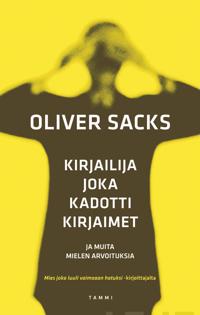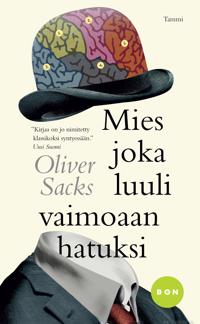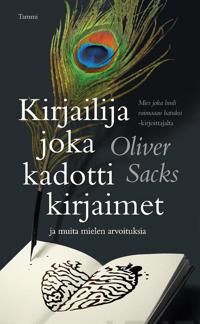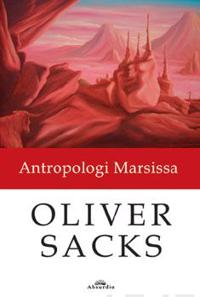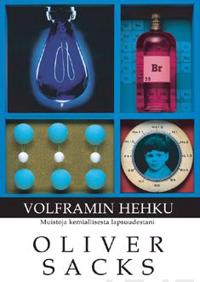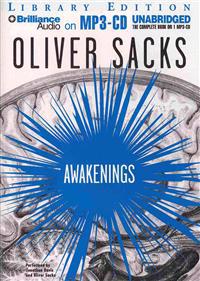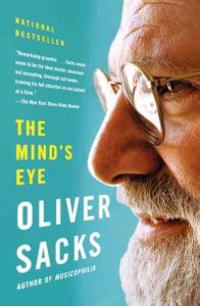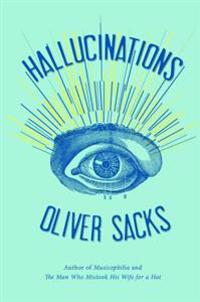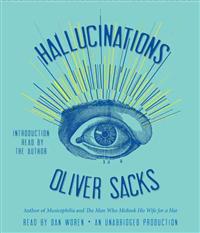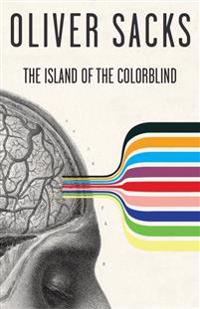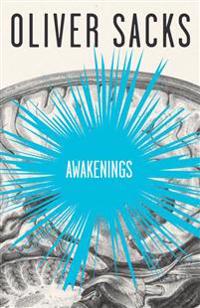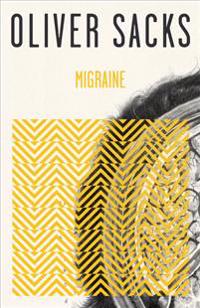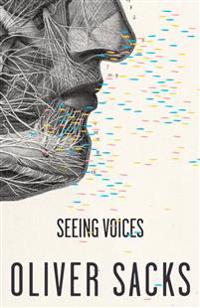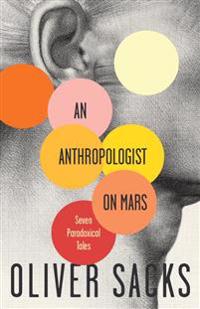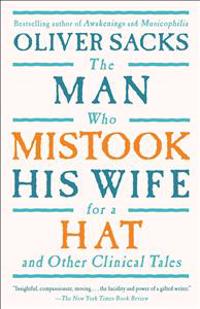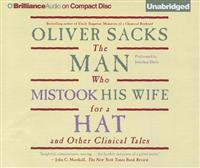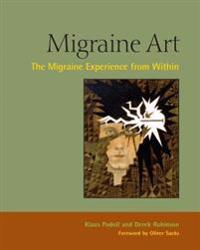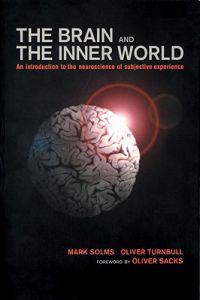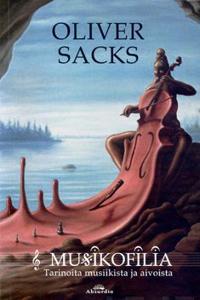Kirjailija joka kadotti kirjaimet ja muita mielen arvoituksia (Inbunden)
avOliver Sacks
ISBN: 9789513162931 - UTGIVEN: 2011Pianisti Lillian menettää yhtäkkiä kyvyn lukea nuotteja ja lopulta myös tunnistaa yksinkertaisia arkisia esineitä. Howard, kirjailija, ei sairauskohtauksen jälkeen osaa enää lukea. Pat joutuu etsimään tavan olla isoäiti sairastuttuaan aivovaurion jälkeen afasiaan. Neurologi Sacks kertoo[...]
Mies joka luuli vaimoaan hatuksi (Pocket)
avOliver Sacks
ISBN: 9789513163501 - UTGIVEN: 2011Teos koostuu arvostetun neurologin Oliver Sacksin empaattisesti ja taidokkaasti kuvaamista potilaskertomuksista kummallisuuden ja nerokkuuden rajoilta. Sacks on omistanut elämänsä potilailleen ja tieteelleen. Hänen kuuluisimpiin teoksiinsa kuuluu Awakenings, josta on tehty myös elokuva Herääm[...]
Kirjailija joka kadotti kirjaimet ja muita mielen arvoituksia (Pocket)
avOliver Sacks
ISBN: 9789513169107 - UTGIVEN: 2012Pianisti Lillian menettää yhtäkkiä kyvyn lukea nuotteja ja lopulta myös tunnistaa yksinkertaisia arkisia esineitä. Howard, kirjailija, ei sairauskohtauksen jälkeen osaa enää lukea. Pat joutuu etsimään tavan olla isoäiti sairastuttuaan aivovaurion jälkeen afasiaan. Neurologi Sacks kertoo[...]
Antropologi Marsissa (Häftad)
avOliver Sacks
ISBN: 9789525516036 - UTGIVEN: 2006Oliver Sacks tunnetaan ennen kaikkea kirjasta Mies joka luuli vaimoaan hatuksi ja elokuvasta Heräämisiä sekä TV-dokumentti-sarjasta Matka mieleen. Matkaksi mieleen voisi luonnehtia myös tätä kirjaa, jossa Sacks kuvaa seitsemän henkilön sopeutumista erilaisiin neurologisiin tiloihin, kuten v[...]
Volframin hehku (Häftad)
avOliver Sacks
ISBN: 9789525516074 - UTGIVEN: 2011Kauan ennen kuin Oliver Sacksista tuli kuuluisa neurologi ja menestyskirjailija ("Mies joka luuli vaimoaan hatuksi"), hän oli pieni englantilainen poika, jonka suuri rakkaus oli luonnontiede. Häntä kiehtoivat yhtälailla metallit ja mineraalit kuin mustekalatkin. Pojan lumottuja tieteellisiä puu[...]
Awakenings (Övrigt)
avOliver W. Sacks, Jonathan Davis, Oliver W. Sacks
ISBN: 9781480530430 - UTGIVEN: 2013-06?Compulsively readable. . . . Dr. Sacks writes beautifully and with exceptional subtlety and penetration into both the state of mind of his patients and the nature of illness generally. . . . A brilliant and humane book.? ? A. Alvarez, The Observer Awakenings ? which inspired the major motion pictur[...]
The Mind's Eye (Häftad)
avOliver W. Sacks
ISBN: 9780307473028 - UTGIVEN: 201110With compassion and insight, Dr. Oliver Sacks again illuminates the mysteries of the brain by introducing us to some remarkable characters, including Pat, who remains a vivacious communicator despite the stroke that deprives her of speech, and Howard, a novelist who loses the ability to read. Sacks [...]
Hallucinations (Inbunden)
avOliver W. Sacks
ISBN: 9780307957245 - UTGIVEN: 201211From the best-selling author of Musicophilia and The Man Who Mistook His Wife for a Hat, a provocative investigation into hallucinations-auditory, visual, tactile, olfactory-their many guises, their physiological sources, and their personal and cultural resonances. Hallucinations, for most people, i[...]
Hallucinations (CD-bok)
avOliver W. Sacks
ISBN: 9780307967329 - UTGIVEN: 2012-11Have you ever seen something that wasn't really there? Heard someone call your name in an empty house? Sensed someone following you and turned around to find nothing?
Hallucinations don't belong wholly to the insane. Much more commonly, they are linked to sensory deprivation, intoxication, illn[...]The Island of the Colorblind (Häftad)
avOliver W. Sacks
ISBN: 9780375700736 - UTGIVEN: 199801"An explorer of that most wondrous of islands, the human brain," writes D.M. Thomas in "The New York Times Book Review," "Oliver Sacks also loves the oceanic kind of islands." Both kinds figure movingly in this book--part travelogue, part autobiography, part medical mystery story--in which Sacks's j[...]
Uncle Tungsten: Memories of a Chemical Boyhood (Häftad)
avOliver W. Sacks
ISBN: 9780375704048 - UTGIVEN: 200209The scientific wonder of youth is skillfully evoked in this intriguing memoir by the distinguished neurologist and author of Awakenings in which he describes his fascination with metals, gases, and chemicals, especially "Uncle Tungsten," and with unravelling the complex mysteries of the world around[...]
Awakenings (Häftad)
avOliver W. Sacks
ISBN: 9780375704055 - UTGIVEN: 199910"Awakenings"--which inspired the major motion picture--is the remarkable story of a group of patients who contracted sleeping-sickness during the great epidemic just after World War I. Frozen for decades in a trance-like state, these men and women were given up as hopeless until 1969, when Dr. Olive[...]
Migraine (Häftad)
avOliver W. Sacks
ISBN: 9780375704062 - UTGIVEN: 199910"Balanced, authoritative . . . brilliant." --The London Times
"Written by one of the great clinical writers of the twentieth century, Migraine . . . should be read as much for its brilliant insights into the nature of our mental functioning as for its discussion of the migraine." --The [...]Seeing Voices (Häftad)
avOliver W. Sacks
ISBN: 9780375704079 - UTGIVEN: 200011Like The Man Who Mistook His Wife for a Hat, this is a fascinating voyage into a strange and wonderful land, a provocative meditation on communication, biology, adaptation, and culture. In Seeing Voices, Oliver Sacks turns his attention to the subject of deafness, and the result is a deeply felt por[...]
An Anthropologist on Mars: Seven Paradoxical Tales (Häftad)
avOliver W. Sacks
ISBN: 9780679756972 - UTGIVEN: 199602To these seven narratives of neurological disorder Dr. Sacks brings the same humanity, poetic observation, and infectious sense of wonder that are apparent in his bestsellers "Awakenings" and "The Man Who Mistook His Wife for a Hat." These men, women, and one extraordinary child emerge as brilliantl[...]
The Man Who Mistook His Wife for a Hat (Pocket)
avOliver W. Sacks
ISBN: 9780684853949 - UTGIVEN: 199804In his most extraordinary book, "one of the great clinical writers of the 20th century" (The New York Times) recounts the case histories of patients lost in the bizarre, apparently inescapable world of neurological disorders. Oliver Sacks's "The Man Who Mistook His Wife for a Hat" tells the stories [...]
A Leg to Stand on (Pocket)
avSacks, Oliver W
ISBN: 9780684853956Dr. Oliver Sacks's books "Awakenings, An Anthropologist on Mars" and the bestselling "The Man Who Mistook His Wife For a Hat" have been acclaimed for their extraordinary compassion in the treatment of patients affected with profound disorders. In "A Leg to Stand On, " it is Sacks himself who is the[...]
Hallucinations (Inbunden)
avOliver W. Sacks
ISBN: 9781410457318 - UTGIVEN: 2013-04Have you ever seen something that wasn't really there? Heard someone call your name in an empty house? Sensed someone following you and turned around to find nothing?
Hallucinations don't belong wholly to the insane. Much more commonly, they are linked to sensory deprivation, intoxication, illn[...]The Man Who Mistook His Wife for a Hat: And Other Clinical Tales (CD-bok)
avOliver W. Sacks, Jonathan Davis
ISBN: 9781455883608 - UTGIVEN: 2012-10In his most extraordinary audiobook, one of the great clinical writers of the twentieth century ("The New York Times") recounts the case histories of patients lost in the bizarre, apparently inescapable world of neurological disorders. Oliver Sacks s "The Man Who Mistook His Wife for a Hat" tells th[...]
Awakenings (CD-bok)
avOliver W. Sacks
ISBN: 9781480530379 - UTGIVEN: 2013-06Compulsively readable. . . . Dr. Sacks writes beautifully and with exceptional subtlety and penetration into both the state of mind of his patients and the nature of illness generally. . . . A brilliant and humane book. A. Alvarez, The Observer Awakenings which inspired the major motion picture is t[...]
Migraine Art (Inbunden)
avKlaus Podoll, Derek Robinson, Oliver W. (FRW) Sacks
ISBN: 9781556436727 - UTGIVEN: 2009-02Brain and the Inner World: An Introduction to the Neuroscience of the Subjective Experience (Häftad)
avMark Solms, Oliver W. Sacks
ISBN: 9781590510179 - UTGIVEN: 200306Musikofilia. Tarinoita musiikista ja aivoista (Inbunden)
avSacks Oliver
ISBN: 9789525516050 - UTGIVEN: 200901Oliver Sacks, jota New York Times on kutsunut lääketieteen hovirunoilijaksi, tarkastelee Musikofiliassa musiikin sijaintia aivoissa ja sen vaikutusta ihmiseen. Hän tutkii musiikin voimaa myötätuntoiseen ja lukeneeseen tyyliinsä potilaiden, muusikkojen ja tavallisten ihmisten kokemusten kautta.[...]

